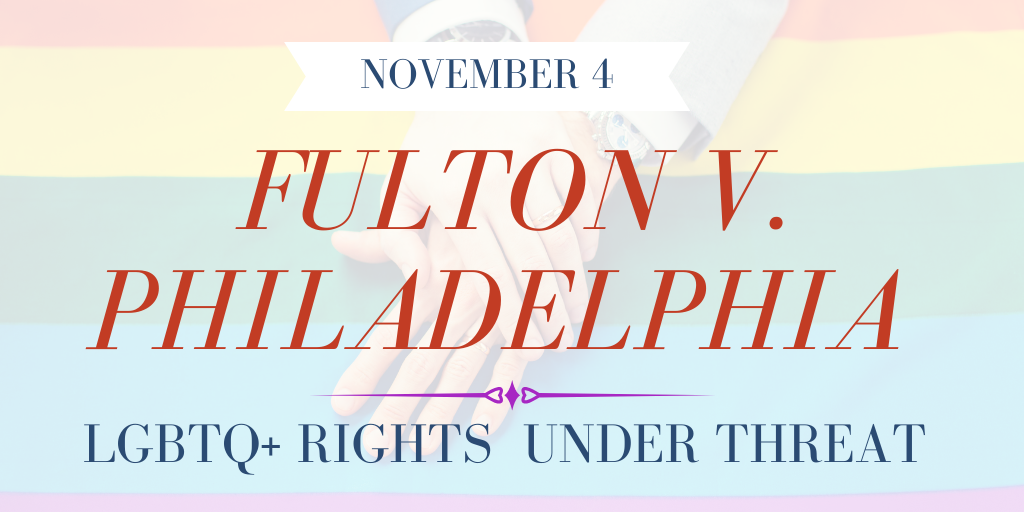
Primary issues: LGBTQ+ rights, women’s rights, gender justice.
Oral Arguments: November 4.
WLP’s Role in the Case: WLP joined an amicus curiae (“friend of the court”) brief filed by National Women’s Law Center supporting the City of Philadelphia and intervenors Support Center for Child Advocates and Philadelphia Family Pride, represented by the ACLU.
Read or download the brief here.
Case Overview
Fulton v. Philadelphia arose out of a dispute between the City of Philadelphia and a Catholic foster care agency.
The City terminated its contract after Catholic Social Services (CSS) refused to place children with LGBTQ+ people seeking to open their homes to care for children in need. CSS also refuses to place children with opposite-sex couples if they are not legally married.
Philadelphia terminated the contract because the city’s Fair Practices Ordinance prohibits discrimination based on race, sex, sexual orientation, disability, age, and other protected identities and covers all city contractors.
In the litigation, Catholic Social Services of Philadelphia claims it does not need to comply with Philadelphia’s anti-discrimination laws and is attempting to force the City to reinstate their taxpayer-funded foster care services contract. They argue that refusing to place children in need with LGBTQ+ applications eager to provide caretaking and homes for these children is an expression of religious freedom protected by the First Amendment.
Over 5,000 children in Philadelphia, over 16,000 children in Pennsylvania, and over 437,000 children in the United States are currently in need of foster care.
Case History
The U.S. District Court for the Eastern District of Pennsylvania rejected the request, so Catholic Social Services sought relief in the U.S. Court of Appeals for the Third Circuit, which upheld the ruling of the lower court in favor of the City of Philadelphia.
The Court rejected CSS’ claim that the city’s anti-discrimination policy was motivated by anti-religious bias or persecution after finding no evidence to support the claim, and noted that the First Amendment “does not prohibit government regulation of religiously motivated conduct so long as that regulation is not a veiled attempt to suppress disfavored religious beliefs.”
In fact, the Court found Philadelphia’s record demonstrated the “city’s good faith in its effort to enforce its laws against discrimination.”
Potential Implications of Fulton V. Philadelphia
The implications of Fulton v. Philadelphia will be felt across the country.
Texas Attorney General Ken Paxton, most recently in the news for ordering Texas social services agencies to allow discrimination against LGBTQ+ people and people with disabilities (an order subsequently reversed), filed an amicus brief supporting Catholic Social Services on behalf of Texas, Alabama, Arkansas, Louisiana, Missouri, Nebraska, Ohio, Oklahoma, West Virginia and the Commonwealth of Kentucky.
If Catholic Social Services is successful, it will set a precedent that could enable private entities to demand taxpayer funding despite refusing to comply with the terms of their contract and the anti-discrimination laws of the land.
Such a precedent could allow widespread, taxpayer-funded discrimination against nearly any class of person designated as a target of religious opposition.
“Religious Freedom” as Cover for Enabling Discrimination
The legal concept of protecting religious freedom in balance with other rights is not partisan. After all, it was Democratic Congressmen Chuck Schumer and Ted Kennedy who proposed the Religious Freedom Restoration Act of 1993 (RFRA), a bill that enjoyed near-unanimous support in Congress. Former President Bill Clinton signed RFRA into law.
Unfortunately, in response to progress toward equal protections for LGBTQ+ people and women, right-wing legal architects have devised strategies that cloak gender discrimination in “religious freedom” rhetoric (as well as First Amendment claims).
The late Justice Ruth Bader Ginsburg sharply noted the Court’s recent “zeal” in securing religious rights over the rights of others in her dissent in Little Sisters of the Poor: “In accommodating claims of religious freedom, this Court has taken a balanced approach, one that does not allow the religious beliefs of some to overwhelm the rights and interests of others who do not share those beliefs.”
This strategy itself is not entirely new. After all, biblical justifications were used to try to justify racism, including slavery and Jim Crow segregation.
To learn more about the issues and arguments in this case, check out SCOTUSblog’s preview here.
The Women’s Law Project is a public interest law center in Pennsylvania devoted to advancing and defending the rights of women, girls, and LGBTQ+ people in Pennsylvania and beyond.
November 2020: Our physical offices are still closed due to the pandemic but we are OPEN and working to serve your needs. Contact us here. Sign up for WLP’s Action Alerts. Stay up to date by following us on twitter, Facebook, and Instagram.
THE MASKED BALL: Our annual Philadelphia gala is on November 20! Please join us for this virtual celebration to support gender justice in Pennsylvania. Sponsorship & ticket info here.


